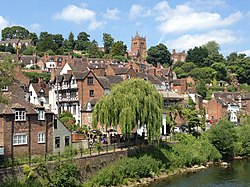Bridgnorth
| Bridgnorth | |
|---|---|
 High Town from the River Severn |
|
 Coat of arms of Bridgnorth Motto: Fidelitas Urbis Salus Regis In the town’s loyalty lies the King’s safety |
|
| Bridgnorth shown within Shropshire | |
| Population | 12,079 (2011) |
| OS grid reference | SO716927 |
| Civil parish |
|
| Unitary authority | |
| Ceremonial county | |
| Region | |
| Country | England |
| Sovereign state | United Kingdom |
| Post town | BRIDGNORTH |
| Postcode district | WV15, WV16 |
| Dialling code | 01746 |
| Police | West Mercia |
| Fire | Shropshire |
| Ambulance | West Midlands |
| EU Parliament | West Midlands |
| UK Parliament | |
Bridgnorth is a town in Shropshire, England. The Severn Valley splits it into a High Town and Low Town, the upper town on the right bank and the lower on the left bank of the River Severn. The population at the 2011 Census was 12,079.
Bridgnorth is named after a bridge over the River Severn, that was built further north than an earlier bridge at Quatford. The earliest historical reference to the town is in 895, at which time it is recorded that the Danes created a camp at Cwatbridge, and subsequently in 912, Æthelfleda constructed a mound on the west bank of the River Severn, or possibly on the site of Bridgnorth Castle, as part of an offensive against the Danes. Earliest names for Bridgnorth include Brigge, Brug and Bruges, all referring to its position on the Severn.
After the Norman conquest, William I granted the manor of Bridgnorth to Roger de Montgomerie. The town itself was not created until 1101, when Robert of Bellême, 3rd Earl of Shrewsbury, the son of Roger de Montgomerie, moved from Quatford, constructing a castle and church on the site of the modern-day town. The town became a royal borough on Robert Bellême's attainder in 1102. The castle's purpose was to defend against attacks from Wales. The town was attacked and burnt by Roger Mortimer, 1st Earl of March during the Despenser War in 1322.
...
Wikipedia

